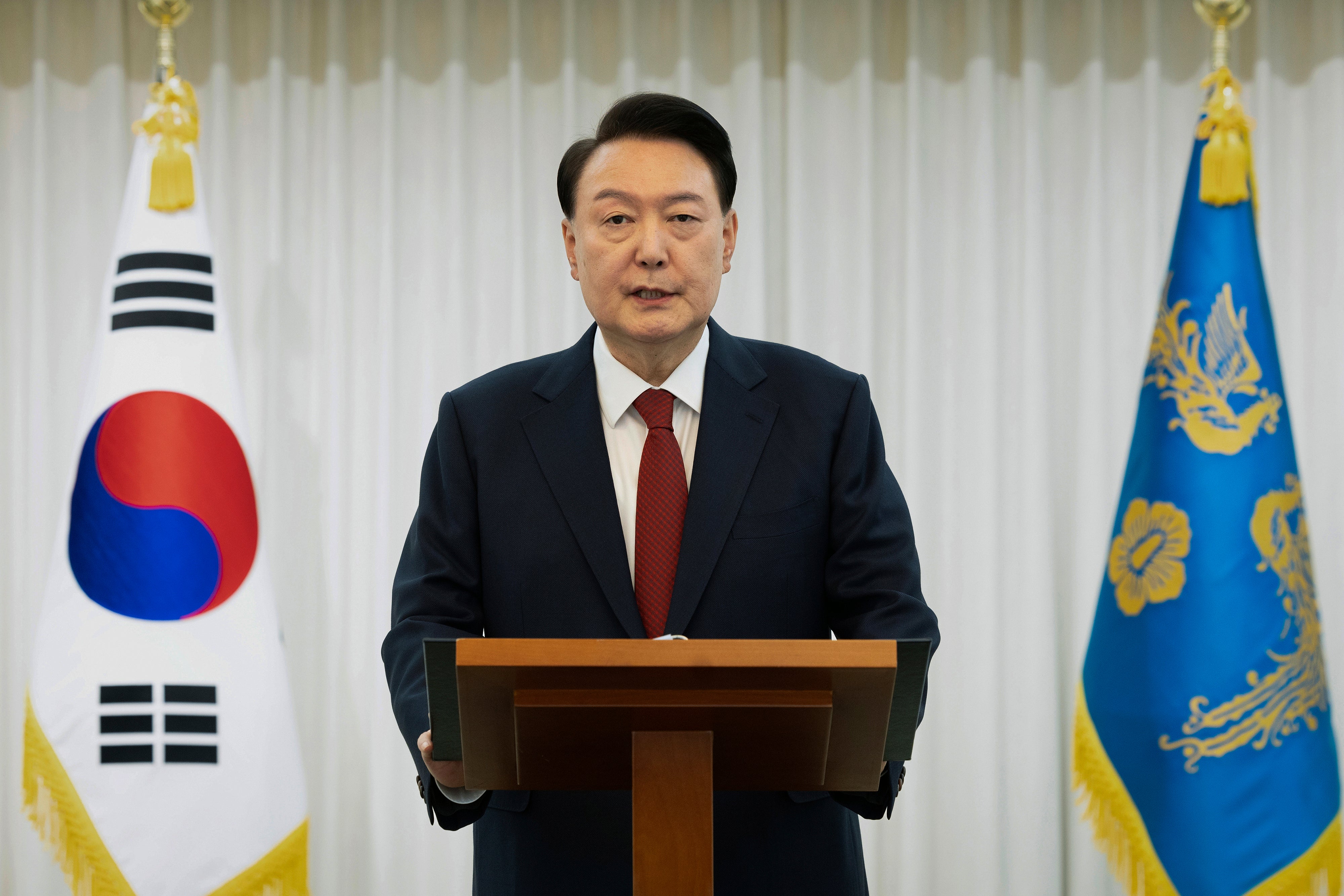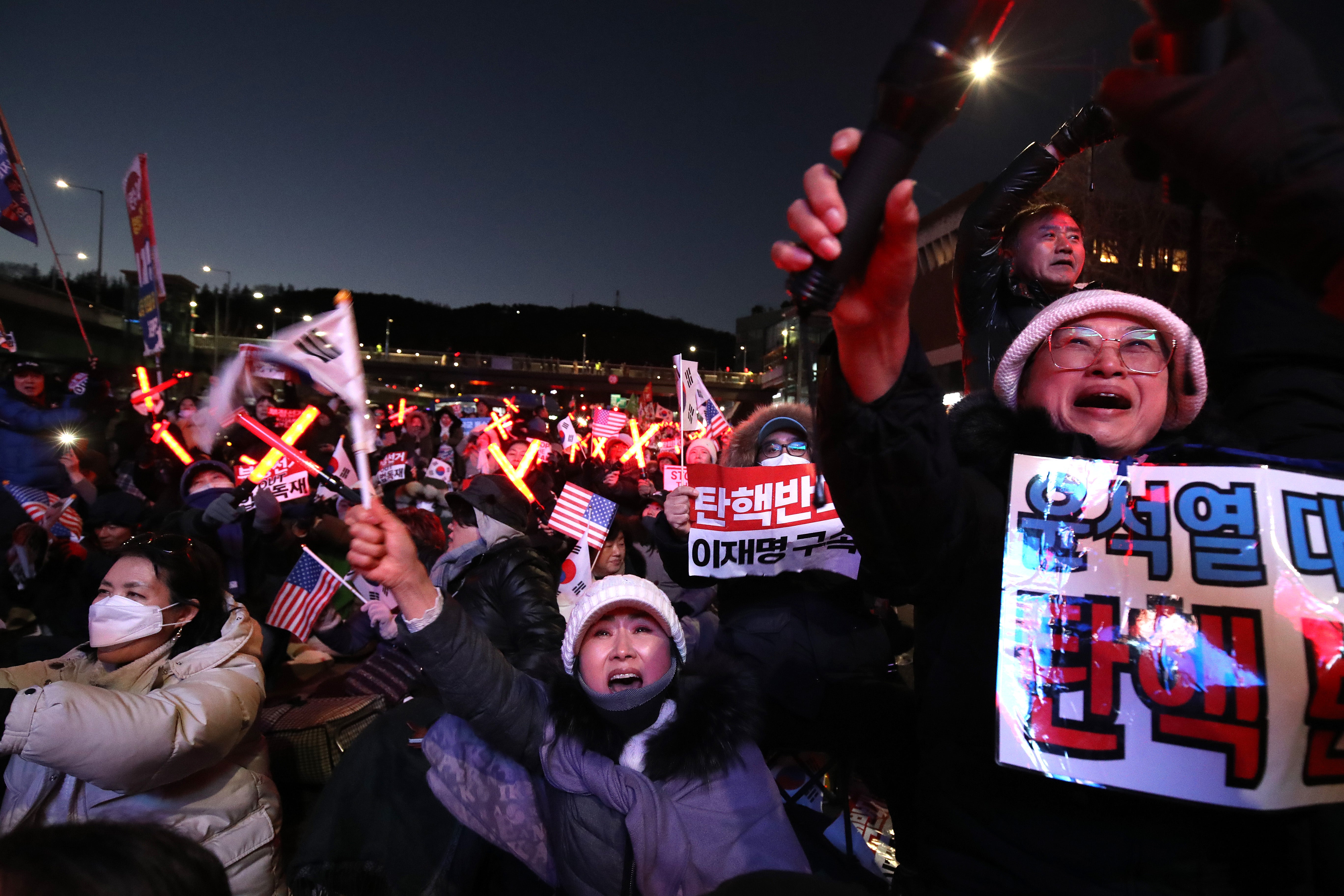South Korean president vows to ‘fight to the end’ as he faces arrest
Yoon Suk Yeol accused of seeking to incite his supporters to obstruct attempts to detain him
South Korea’s impeached president Yoon Suk Yeol has vowed to “fight to the end” as authorities dispatched investigators to execute a warrant to detain him over his shock attempt to impose martial law.
As his lawyers warned that police officers attempting to detain him on behalf of South Korea’s anti-corruption agency could themselves face arrest “by either the presidential security service or any citizens”, Mr Yoon sent a defiant message to supporters rallying outside his Seoul residence.
Mr Yoon vowed to “fight to the end” against anti-state forces “violating our sovereignty” and putting the nation in “danger”, while his lawyers claimed that any attempt by the anti-corruption agency to use police units for his detention would exceed their legal authority.
The message was swiftly condemned by South Korea’s Democratic Party, which accused Mr Yoon of “trying to stage insurrection” and inciting his supporters to obstruct attempts to detain him. South Korean law permits anyone to make an arrest to stop an active crime.
Investigators from the Corruption Investigation Office for High-Ranking Officials (CIO) were seen loading boxes into several vehicles before leaving their building in the city of Gwacheon early on Friday morning (Thursday UK time). Television footage later showed some of those vehicles weaving between police buses that tightly packed and barricaded the streets near Mr Yoon’s residence.
Braving sub-zero temperatures, thousands of Mr Yoon’s supporters rallied for hours near his residence on Friday (Thursday UK time) amid a heavy police presence, waving South Korean and American flags while chanting “Nullify the impeachment” and “We will protect President Yoon Suk Yeol”.
Officers removed some protesters who lay down on a road leading to the entrance of Mr Yoon’s residence, but there were no immediate reports of major clashes.
Mr Yoon is South Korea’s first sitting president to face arrest, after the CIO said on Tuesday that a Seoul court had granted the detention warrant sought by prosecutors investigating whether Mr Yoon’s shortlived declaration of martial law amounted to insurrection.
The warrant – valid until 6 January – came after the president ignored multiple summons for questioning over charges of insurrection and abuse of power, accusations his lawyers have claimed are “unlawful”.

One of Mr Yoon’s lawyers said on Tuesday that he had “no reason to avoid the investigation” – but his conduct should be judged by the constitutional court rather than via criminal proceedings.
The constitutional court is preparing to rule on the validity of Mr Yoon’s impeachment by the National Assembly, in a vote led by the Democratic Party. To formally end Mr Yoon’s presidency, at least six justices on the nine-member court must vote in favour.
Following his remarks on Thursday, the Democratic Party called for law enforcement authorities to execute the detention warrant immediately. But it remains unclear whether he can be compelled to submit to questioning.
“The Corruption Investigation Office must detain him immediately, and the presidential security service must cooperate with the lawful execution of the detainment warrant,” said the party’s floor leader Park Chan-dae.
“They should be aware that obstructing the execution of the detainment warrant could result in punishment for interference with official duties and complicity in insurrection,” he said.
The leader of an insurrection can face the death penalty or life imprisonment if convicted under South Korean law. Mr Yoon has presidential immunity from most criminal prosecutions, but this privilege does not extend to allegations of insurrection or treason.

The president’s decision to declare martial law on 3 December plunged the country into a political crisis, leading to widespread protests and the impeachment of not only Mr Yoon but also his acting successor Han Duck Soo. The move has also halted high-level diplomacy and rattled financial markets.
But South Korea’s first imposition of martial law in more than 40 years ended after just six hours when the National Assembly voted 190-0 to lift it – despite attempts by heavily armed soldiers to prevent them from voting.
Mr Yoon has sought to claim his martial law decree was a necessary act of governance, portraying it as a temporary warning against the Democratic Party, which he has described as an “anti-state” force obstructing his agenda with its legislative majority.
Also on Thursday, Mr Yoon’s lawyer filed a challenge with the Seoul Western District Court to block both the detention warrant for the president and a related search warrant for his residence. The lawyer argued that both warrants violate criminal laws and the constitution.
Some experts believe the CIO, which is leading a joint investigation with police and military authorities, would not risk clashing with Mr Yoon’s security service, which has said it will provide security to Mr Yoon in accordance with the law.
The agency may instead issue another summons for Mr Yoon to appear for questioning if they are not able to execute the detainment warrant by 6 January.
If Mr Yoon is detained, the anti-corruption agency will have 48 hours to investigate him and either request a warrant for his formal arrest or release him. Mr Yoon’s defence minister, police chief and several top military commanders have already been arrested over their roles in the martial law enactment.
Additional reporting by AP and Reuters
Join our commenting forum
Join thought-provoking conversations, follow other Independent readers and see their replies
Comments
Bookmark popover
Removed from bookmarks